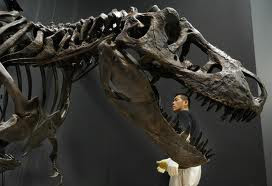A study reveals that Tyrannosaurus rex had the most powerful
bite of any creature that has ever walked the Earth. The research led by Dr
Karl Bates from the biomechanics laboratory at the University of Liverpool.
Then the scientists reproduced the full force of a bite by activating the
muscles to contract fully snapping the digital jaws shut.
Previous studies had estimated that T. rex's bite had a
force of 8,000-13,000 Newtons. The researchers discovered how T. rex's bite
force changed as it grew. The maximum forces we found - up at the [back] teeth
- were between 30,000 and 60,000 Newtons. These animals are extremes - one of
the biggest carnivores that ever lived," he said. "So it tells you a
lot about the limitations of biology.





